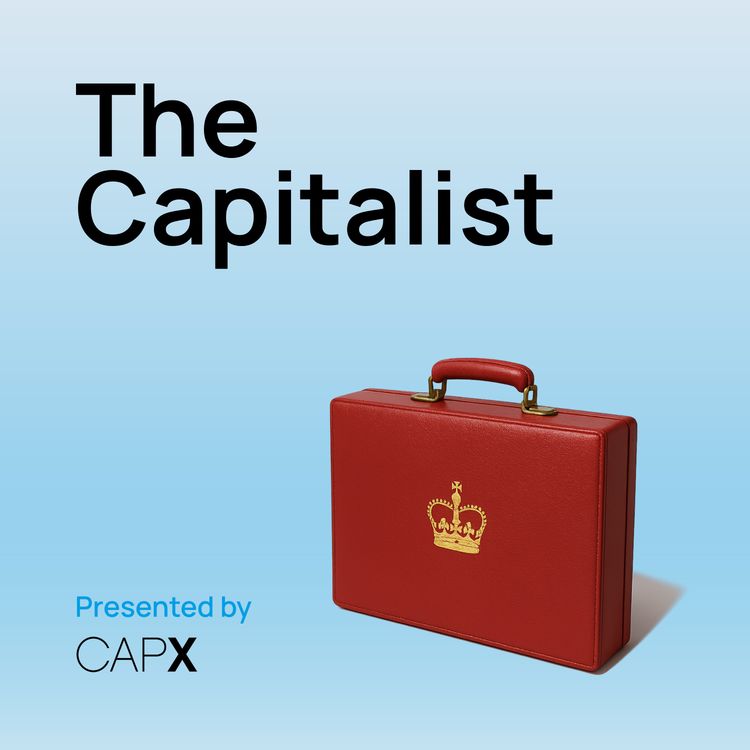Share

The Capitalist
Despatch: Steel Trap — Why Nationalisation Won't Work
Season 1, Ep. 15
•
Harry Phibbs asks a pointed question in this week's Despatch: if nationalisation has failed before, why are we doing it again? With Parliament recalled for an emergency Saturday sitting to save British Steel, the political consensus was deafening — and expensive. But is this really a matter of national security, or just another costly round of state interference dressed in patriotic clothing? From HS2 to Net Zero, Phibbs argues that consensus is the real danger — and nationalised steel is the latest case in point. Tune in for a sharp-eyed look at Britain’s industrial nostalgia, and why we should all be watching our wallets.
Stay informed with CapX's unmissable daily briefings from the heart of Westminster. Go to capx.co to subscribe.
More episodes
View all episodes

53. Will Trump strike Iran?
25:54||Season 1, Ep. 53What happens when a regime shuts off the internet — and then turns its guns on its own people? For the IEA's Mani Basharzad, the question is deeply personal: he hasn't heard from his mother or friends in Iran for days. As the country plunges into its most violent crackdown in decades, reports of mass killings, information blackouts and nationwide protests raise a stark question: is the Islamic Republic finally losing control?In this urgent episode of The Capitalist, Joseph Dinnage speaks to Mani about what an internet shutdown really means on the ground, why this wave of protests feels fundamentally different from those that came before, and how a broad coalition of Iranians — rich and poor, secular and religious — are rallying around the prospect of regime change. Mani explains the role of Crown Prince Reza Pahlavi, the economic collapse hollowing out the state, and why this movement is less a revolution than a fight to reclaim basic normality.
Despatch: Is Britain sacrificing a generation to unemployment?
08:11|As ministers insist the labour market is merely “normalising”, the numbers tell a more troubling story — especially for the young. In this essay, Damian Pudner, an independent economist specialising in monetary policy, argues that Britain is sliding into a slow-burn recession under Rachel Reeves, with youth unemployment surging and entry-level jobs disappearing. Higher payroll taxes, tighter regulation and rising business costs, he warns, are scarring a generation before their working lives have properly begun — with consequences that could haunt the economy for decades.Despatch brings you the best articles from CapX’s unrivalled daily newsletter.
52. The Rage of Party with George Owers
31:52||Season 1, Ep. 52Are today’s culture wars, party fractures and populist backlashes really something new — or are we simply reliving an old British story? In this episode of The Capitalist, Marc Sidwell looks three centuries into the past to understand the political turmoil of the present. From riots over immigration to furious pamphlet wars, from elite anxiety about misinformation to bitter arguments over Britain’s role in Europe, the foundations of modern politics were laid in the age of Whigs and Tories.Marc is joined by historian and author George Owers, whose book "The Rage of Party" (one of CapX's favourites of 2025) brings the birth of British party politics vividly to life. Together they explore the explosive origins of left and right, the rise of finance and global ambition, the dangers of suppressing demagogues, and why moderation — however unfashionable — has always been the hardest political art to master.
Special: Sir Malcolm Rifkind on Margaret Thatcher
06:11|Margaret Thatcher remains one of the most consequential leaders in modern British history. Rising to power after the "Winter of Discontent," she steered the country through economic turmoil, high inflation, and widespread industrial unrest. Her bold embrace of free-market principles reshaped Britain — and left a legacy still fiercely debated today.Now, as political uncertainty returns to Westminster, Thatcher’s conviction-led leadership feels more relevant than ever.In this short interview, former Foreign Secretary Sir Malcolm Rifkind — one of only five ministers to serve throughout both the Thatcher and Major governments — reflects on his time at the heart of power. With insight and candour, he reveals what set Mrs Thatcher apart, and why her leadership style made such a lasting impact, even in the face of fierce opposition.
51. Forecast 2026: Has Nigel Farage peaked?
17:44||Season 1, Ep. 51With local elections looming in May, Labour collapsing in the polls, and Westminster rumbling with leadership intrigue, Marc Sidwell asks whether Sir Keir Starmer is heading for a reckoning — and whether figures like Ed Miliband could seize the moment. Meanwhile, Reform UK continues to hover around the 30% mark, the Conservatives search for a bounce under Kemi Badenoch, and Britain’s politics looks increasingly like a multi-party fight.In this new year forecast, Marc is joined by Joseph Dinnage, Deputy Editor of CapX, to map the fault-lines of the next 12 months — from the battle for the right, to the economic hard choices that no party can dodge, to America’s 250th birthday under Donald Trump and the possibility of a post-Trump succession fight led by JD Vance. If 2025 was the year the centre cracked, 2026 may be the year it fully gives way.
50. Is the political centre breaking?
23:53||Season 1, Ep. 50Is Britain entering an age of permanent political fragmentation? As Labour falters despite its landslide victory, Reform UK surges, the Greens flirt with wealth taxes, and the Conservatives search for renewed purpose under Kemi Badenoch, the old certainties of British politics are unravelling. Across the Atlantic, Donald Trump’s second term has proved no less turbulent — from the collapse of his Department of Government Efficiency to a tariff regime that’s shaken the global trading order.In this end-of-year review, Marc Sidwell is joined by Joseph Dinnage, Deputy Editor of CapX, to take stock of a chaotic political year. Together they explore why reform has proved so elusive, how populism is reshaping both left and right, and what Trump’s unpredictability means for Britain, Europe and the global economy.
Despatch: Education needs more scrutiny
07:58|With nearly a million under-24s out of work, education or training, good intentions are no longer enough. In this essay, John Penrose, Chair of the Conservative Policy Forum, argues that Britain’s education and careers system is quietly wasting talent — steering young people into the wrong courses, offering patchy guidance, and making it far too hard to change direction later in life. His solution is strikingly pragmatic: better information on outcomes, stronger careers advice in schools, and a smarter system to recognise real-world skills — reforms that could transform life chances without costing the taxpayer a fortune.Despatch brings you the best of CapX — the sharpest writing from the UK’s most insightful daily newsletter.
48. Is the Online Safety Act doomed?
36:16||Season 1, Ep. 48What happens when foreign governments try to police American speech? For years, UK and EU regulators have slapped massive fines on U.S. tech firms — but Washington may finally be ready to hit back. Free speech lawyer Preston Byrne joins The Capitalist to unveil the GRANITE Act, a bold new proposal that would strip foreign regulators of immunity in U.S. courts and allow American companies to sue for millions in damages.In a wide-ranging conversation, Byrne explains how a growing clash over online regulation could redefine the internet itself — and why the next front in the global free speech war may be fought not in Silicon Valley or Brussels, but in Washington.
Despatch: All parties should be subjected to the OBR
08:12|What if every political party had to face real economic scrutiny? As Britain’s political landscape fragments and fiscal debate grows ever more chaotic, Joseph Dinnage, deputy editor of CapX, asks a provocative question: should the Office for Budget Responsibility judge all parties, not just the one in power? In this essay, he charts Rachel Reeves’s faltering economic credibility, the radicalism of the Greens and Your Party, and the inconsistencies on the Right — arguing that an upgraded OBR, modelled on the Dutch system, could bring much-needed discipline and transparency to a system swamped by unserious ideas. It wouldn’t make forecasting perfect, he says, but it would help voters see which plans add up — and which are pure fantasy.Despatch brings you the best of CapX — the sharpest writing from the UK’s most insightful daily newsletter.